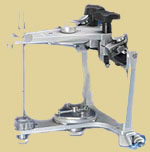...........................3 Manuka
Rd ,Berwick.VIC. Ph:97073956
|
ADJUSTING
TO YOUR NEW DENTURE |

|
| ........You've just received your new dentures. whether you're a seasoned veteran or a newdenture wearer, we're sure there are many questions which may need to be answered. We hope that the following information will prove to be helpful during the next few weeks of your denture adjustment period. .......Learning to wear a new denture can take time. Don't become discouraged if you find some difficulty in the beginning. YOU'RE NOT ALONE! Please do not listen to friends who tell you how easy it was for them to get used to their dentures and how they can eat everything and anything. They are either bragging, have greater bone and gum support or their memories may be poor. Your dentist will help you through any difficulties you may face or any situations that may arise during your adjustment period. .......A lower denture usually takes more time to adjust to than an upper denture. The tongue may feel restricted and will tend to play, sometimes even subconsciously, with the new prosthesis. It will soon adapt to the restrictions and to the new feeling that a denture presents. ......Try to eat only soft foods for the first couple of days. Then, as you progress to more solid foods try to eat slowly and deliberately, attempting to place even amounts of food on both sides at the same time during the chewing cycle. By placing food on both sides of the mouth at the same time, you balance the biting forces on the new denture and will help to make it more stable. The longer you take to eat your meal, the faster you will learn to master your new prosthesis. .......Try to take small bites at first. Cut all your food into small portions. If, and when, your gum tissues are strong enough to try foods which are bitten off (bread, corn on the cob, etc. ), try to press the food against the back teeth on the upper in order to stabilize the denture. .......It is perfectly normal to experience some discomfort associated with sore spots during the adjustment period. Nature did not intend for us to wear hard plastic against soft gum tissue. It takes a while for the gum tissues to firm up and to accommodate to the hard plastic denture. .......If sore spots should develop (and in some cases they do not), please be sure to wear the denture for at least 24 hours prior to your adjustment visit! If your dentist can't see the sore spot visually, it is sometimes impossible for him to make the necessary adjustments .......Reading aloud during the first couple of days will go a long way in reducing any minor speech problems which may result from wearing a new denture. If speech problems continue to persist, please let your dentist know. ......An unclean denture is neither healthy, attractive or comfortable. Clean you new denture every morning and night with either a denture toothbrush and denture toothpaste ( if necessary, any toothpaste can be used ) or with one of the commercially available denture cleaners. Please be sure to check with your dentist to make sure that the commercial cleaner will not interfere with the type of denture liner you may have in your prosthesis. Permanent soft liners and temporary soft liners react poorly to most commercial cleaners. ......We prefer that you leave out one or both of your dentures at night. This allows your gum tissues to breathe and also relieves them of the constant pressures of mastication. When left out of the mouth, all dentures should be left in water to prevent warpage. .Gum tissues are in a constant state of change but dentures are not. Therefore, periodic relining of your dentures may be necessary. If you find your denture getting looser and mastication more difficult, this may be a sign that a reline may be needed. It is very important for your dentist to see you regularly to evaluate the state of your oral tissues and to determine if additional treatment is required. Dentures typically need to be relined or remade every 3-5 years. ......NEVER try to adjust your dentures yourself ! Home remedies, although simple, will only lead to trouble. |
|

